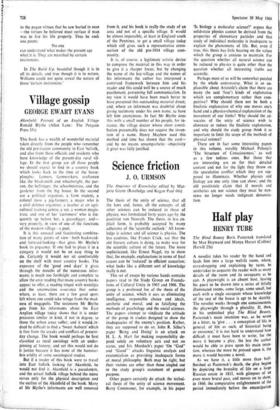Science friction
J. 0. URMSON
The thesis of the unity of science, that all the laws and, hence, all the concepts of all other sciences can be reduced to those of physics, was formulated forty years ago by the positivist von Neurath. The thesis, in less ex- plicit form, is probably accepted by many adherents of the 'scientific outlook.' All know- ledge is science and all science is physics. The less cautious, like Francis Crick, say that the old literary culture is dying, to make way for the scientific culture of the future. The more sophisticated, like Ernest Nagel, try to show that, for example, explanations in terms of final causes can be 'reduced' to efficient causation; what looks like a different sort of knowledge really is not.
This set of essays by various hands contains papers read to the Study Group on Founda- tions of Cultural Unity in 1965 and 1966. The group is a professed foe of the thesis of the unity of science, which it sees as eliminating intelligence, responsible choice and ideals, aesthetic and moral, and as falsifying the methods of psychology and the social sciences. The papers attempt to vindicate the attitude of the group in studies designed to show the inadequacies of the enemy's position. Rather, they are supposed to do so; John R. Silber's paper 'Being and Doing' is an attack on H. L. A. Hart for making responsibility de- pend solely on voluntary acts and not on status, and Iris Murdoch's paper 'On "God" and "Good"' attacks linguistic analysis and existentialism as providing inadequate forms of. moral philosophy. Both may be right, but their victims are other than those singled out in the study group's statement of general purpose.
Other papers certainly do attack the techni- cal thesis of the unity of science movement. Barry Commoner, for example, in his paper
Is biology a molecular science?' argues that soliclAtate physics cannot be derived from the properties of elementary particles and that study of individual molecules is inadequate to explain the phenomena of life. But, even if true, this thesis has little bearing on the values which the group is anxious to maintain. For the question whether all natural science can be reduced to physics is quite other than the question whether all interesting truths are scientific.
Perhaps most of us will be somewhat puzzled by the whole controversy. What is so un- plausible about Aristotle's claim that there are many (he said 'four') kinds of explanation which are complementary rather than com- petitive? Why should there not be both a finalistic explanation of why one moves one's hand and a physico-chemical explanation of the movement of our limbs? Why should the ad- vocates of the unity of science wish to eliminate or reduce the finalistic explanation, and why should the study group think it so important to limit the scope of the methods of physical science?
• There are in fact some interesting papers in this volume, notably Michael Polanyi's 'The Structure of Consciousness,' as well as a few tedious ones. But those that are interesting are so for their detailed content and not for the light they throw on the speculative conflict which they are sup- posed to illuminate. Whether physics and biology are one only time can show; and the old positivistic claim that if morals and aesthetics are not science they must be non- sense no longer needs indignant denuncia- tion.


































 Previous page
Previous page